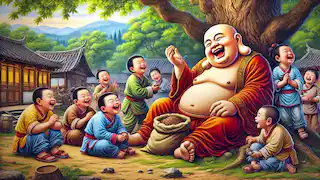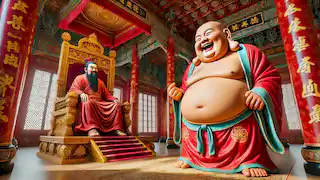In the heart of ancient China, a figure of immense warmth, joy, and serenity emerged, capturing the imagination of all who encountered him. This figure was none other than the Laughing Buddha, a beloved deity in Chinese folklore and culture. Known for his large belly, infectious laughter, and a perpetual smile, the Laughing Buddha represented contentment, prosperity, and happiness. His image, found in homes, temples, and marketplaces, continues to inspire people across the globe. But what is the true story behind this joyous figure? Who was he, and how did he come to embody such positive energy in a world often marred by hardship? Let us delve into the ancient tale of the Laughing Buddha, known as Budai in Chinese, and discover the profound wisdom and joy he brought to the people of China. Many centuries ago, in the Tang Dynasty (618–907 CE), there lived a peculiar monk who was unlike any other. His name was Qieci, but he was more affectionately called "Budai," meaning "Cloth Sack." This nickname came from the large cloth bag he carried on his shoulder, a sack filled with various trinkets, toys, and simple gifts that he would hand out to children and villagers as he wandered from town to town. Unlike the stern and disciplined monks of his era, Budai was known for his carefreeness, his boundless laughter, and the joy that followed wherever he went. He seemed to live without a worry in the world, a stark contrast to the seriousness of the times. Budai was not a monk who adhered strictly to religious rituals or rules. Instead, he lived life according to a simple philosophy: happiness is a choice, and the present moment is to be cherished. He would often sit under the shade of trees, surrounded by children, laughing heartily, telling stories, and spreading wisdom in his playful, jovial manner. In one village, a group of local scholars approached him and asked, "How can you, a monk, always be so happy when the world is filled with suffering and pain?" Budai's belly shook with laughter at their serious question, and he replied, "If you spend your time worrying about tomorrow, you will miss the beauty of today. Look around you, the flowers bloom, the birds sing, and the sun shines. Is that not reason enough to smile?" His words, though simple, resonated deeply with those who heard them. Budai had a unique way of reminding people that joy could be found in the smallest of moments if only they allowed themselves to see it. Budai continued his journey through the countryside, his sack swinging over his shoulder as he meandered from village to village. Wherever he went, people welcomed him with open arms. He was often invited to join meals, partake in festivities, and offer his cheerful company to those in need of a lighthearted distraction from their everyday struggles. In a small town nestled between the mountains, Budai encountered a widow named Mei who had recently lost her husband. Mei was consumed with grief, and her home was filled with the sorrow of mourning. Budai, noticing her pain, knocked on her door, offering her a small wooden toy from his sack. "This is for your son," he said, smiling warmly. Mei looked puzzled and replied, "But I have no son." Budai chuckled and said, "Then perhaps it is for the child you will meet one day. A gift for the future, to remind you that life goes on, and joy will find its way back into your heart." Though perplexed by his words, Mei kept the toy. As time passed, her grief began to ease, and she started to remember the moments of happiness she once shared with her late husband. Budai's visit had left a profound impact on her, not because he had taken away her sorrow but because he had reminded her that happiness was not lost forever—it was simply waiting to return. Throughout his travels, Budai encountered countless people like Mei, each with their struggles and heartaches. But through his laughter, his words, and his seemingly magical sack of gifts, he had a way of lifting their spirits, reminding them that life, though filled with suffering, was also full of laughter and love. One of the most curious aspects of Budai was his mysterious cloth sack. Children would gather around him, eager to see what new treasures he would pull from its depths. Sometimes it was a simple toy, other times a piece of fruit, and occasionally something as mundane as a pebble. But no matter what he gave, it always brought joy to those who received it. Rumors began to spread about the origins of his sack. Some believed it was magical, that it could never be emptied and always produced what was most needed in the moment. Others thought it was a symbol of Budai's generosity, a representation of his belief that the more one gave, the more one received in return. Yet, no one knew for certain. One day, a curious child asked Budai directly, "What's inside your sack?" Budai, with his ever-present grin, patted the sack and replied, "Ah, my dear, it holds the secret to happiness." The child, wide-eyed with wonder, asked, "Can I see it?" Budai winked and said, "You already have. It's not the toys or the gifts that bring joy—it's the act of sharing, of giving what you can to make someone else smile. That is the real treasure." From that moment on, the child understood that the true magic of Budai's sack wasn't in the items it held, but in the kindness and laughter that Budai shared with the world. It was a simple lesson, yet one that left a lasting impression on all who crossed his path. As Budai's fame spread, his reputation eventually reached the ears of the emperor himself. Intrigued by the tales of the laughing monk, the emperor sent a royal decree, inviting Budai to the palace. The messengers found Budai in a small village, surrounded by a group of children, playing a game of catch with a ball he had pulled from his sack. "Master Budai," one of the messengers said, bowing respectfully, "the emperor has heard of your wisdom and wishes to meet you." Budai smiled and shrugged, saying, "I am but a simple monk, with nothing to offer an emperor. But if it is my laughter he seeks, I will gladly share it." The messengers escorted Budai to the imperial palace, where the emperor awaited him in a grand hall. Upon meeting Budai, the emperor was struck by his humble appearance—his robes were tattered, his belly protruded, and his face was marked by the lines of countless smiles. Yet, there was an undeniable presence about him, a warmth that filled the room. The emperor, seated on his throne, asked, "You are known as the Laughing Buddha, a man who brings joy wherever he goes. Tell me, how can a monk such as yourself remain so carefree in a world filled with sorrow and hardship?" Budai laughed, his belly shaking, and replied, "Your Majesty, the world is indeed filled with suffering, but it is also filled with beauty. The trick is to focus on the good, to find happiness in the little things. A child's laughter, the warmth of the sun, a simple meal shared with friends—these are the true treasures of life." The emperor, moved by Budai's words, asked him to stay at the palace as a royal advisor. But Budai, ever the wandering monk, declined. "I am a traveler, Your Majesty," he said. "My path lies with the people, not within the walls of a palace. But know this: happiness is not something you can possess. It is something you create." With that, Budai left the palace, returning to his simple life of wandering and spreading joy to those who needed it most. As the years passed, the legend of the Laughing Buddha continued to grow. Budai's image became a symbol of happiness and prosperity, and his teachings of contentment in simplicity spread far and wide. People began to place statues of Budai in their homes and temples, believing that his presence would bring good fortune and happiness to their lives. But Budai himself remained unchanged. He continued to wander the countryside, his sack slung over his shoulder, his laughter echoing through the villages. He never sought fame or recognition, content to live his life in the present moment, finding joy in the simple act of giving. One evening, as Budai sat beneath a tree, watching the sunset, a young monk approached him. "Master Budai," the monk said, bowing respectfully, "I have traveled far to find you. I seek the path to enlightenment, and I have heard that you possess great wisdom." Budai chuckled and gestured for the monk to sit beside him. "Enlightenment, you say? Well, my friend, you won't find it by chasing after it. Sit here with me, and watch the sunset. Feel the warmth of the breeze. Listen to the birds singing. That is where enlightenment lies—in the simple moments of life." The young monk, puzzled by Budai's words, sat in silence. As the sun dipped below the horizon, a sense of peace washed over him. For the first time, he understood what Budai had been trying to teach: that enlightenment was not some distant goal to be achieved, but rather something that could be found in the present moment, in the beauty of everyday life. ### The Passing of the Laughing Buddha Eventually, Budai grew old. His once energetic body began to slow, but his laughter never faded. He continued to wander, though his journeys became shorter, and his sack a little lighter. But even in his old age, he remained a source of joy and inspiration to those around him. One day, while resting beneath a tree in a small village, Budai closed his eyes for the last time. His passing was peaceful, his face still adorned with the same gentle smile that had touched so many lives. The villagers who had known him gathered to pay their respects, and though they mourned his passing, they also celebrated the life he had lived—a life filled with laughter, generosity, and an unshakable belief in the power of happiness. After Budai's death, his legend continued to grow. Stories of his wisdom and laughter spread far beyond the borders of China, reaching other parts of Asia and the world. His image, often depicted as a chubby, smiling monk with a large belly and a sack slung over his shoulder, became a symbol of prosperity, contentment, and good fortune. Statues of the Laughing Buddha can be found in homes, gardens, and temples across the globe, a reminder of the simple yet profound message he embodied: that happiness is not something to be sought after, but something to be created and shared with others. Even today, the Laughing Buddha continues to inspire people to find joy in the present moment, to appreciate the beauty of life's small pleasures, and to spread kindness and laughter wherever they go. The story of the Laughing Buddha is one of joy, generosity, and a deep understanding of what it means to live a life filled with happiness. His teachings, though simple, carry a profound truth that resonates across cultures and generations: that happiness is not found in wealth or status, but in the simple moments of life, in the act of giving, and in the choice to embrace joy, even in the face of hardship. Budai’s life and legacy remind us that we all have the capacity to bring happiness to ourselves and others, simply by living in the present, sharing what we can, and never forgetting the power of a smile.The Wandering Monk

A Stranger in Every Town
The Secret of the Sack
The Emperor's Request

The Legend Grows

The Legacy of Joy

Conclusion
The Story of the Laughing Buddha
Reading Time: 10 min

About Story: The Story of the Laughing Buddha is a Folktale Stories from china set in the Medieval Stories. This Humorous Stories tale explores themes of Wisdom Stories and is suitable for All Ages Stories. It offers Cultural Stories insights. The joyful journey of a wandering monk who transformed lives with laughter.


















